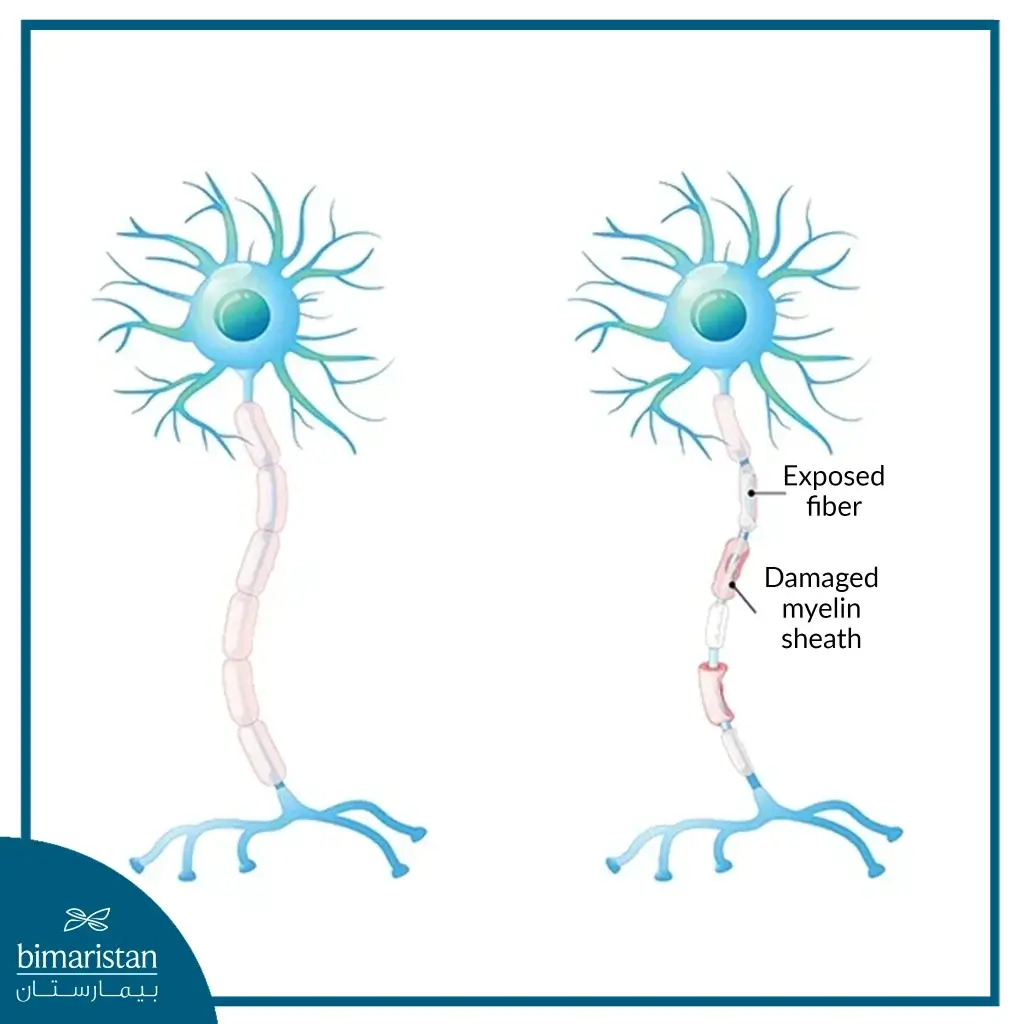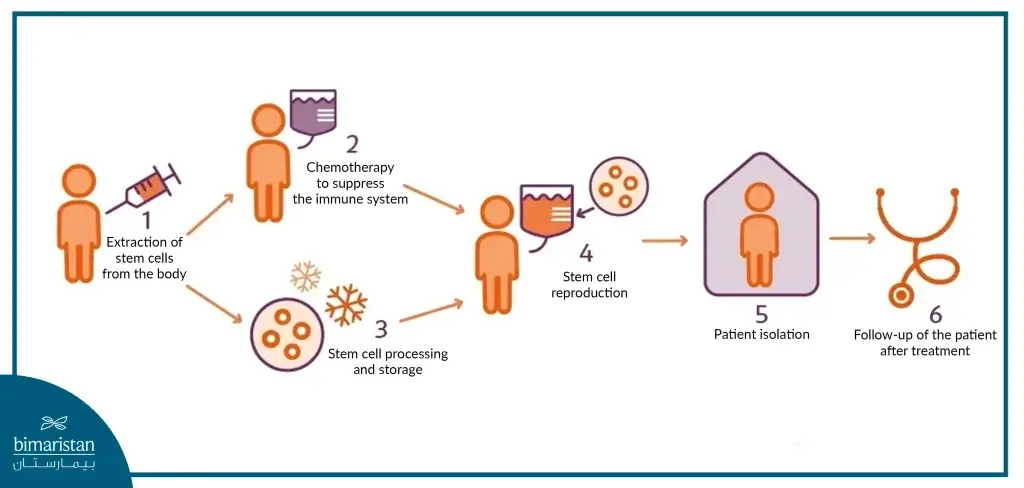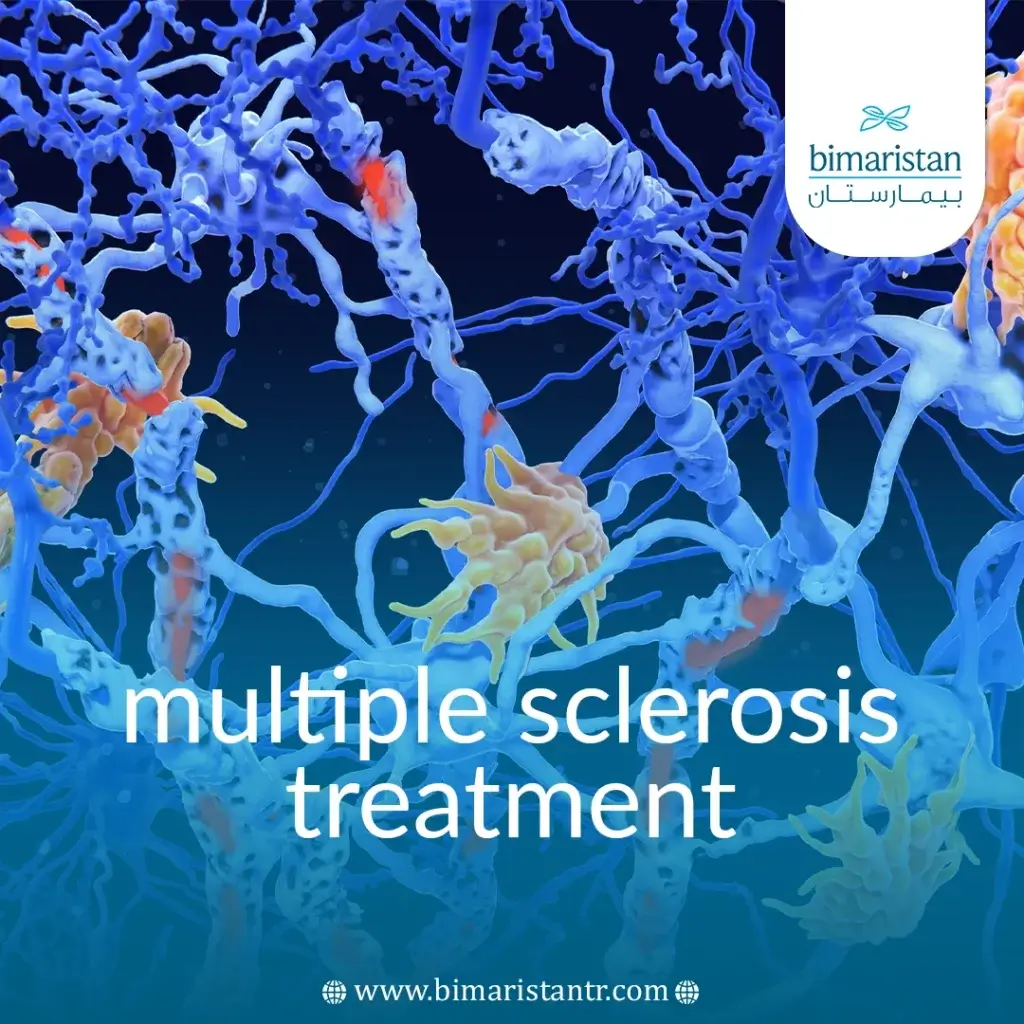Multiple sclerosis treatment aims to control the symptoms of the disease because the body attacks the central nervous system, and there is no cure for multiple sclerosis yet.
To date, no final cure has been found for multiple sclerosis. The basic principle in treating multiple sclerosis is alleviating the patient’s symptoms and improving his life. (Multiple sclerosis does not in itself pose a threat to the patient’s life, and if the patient adheres to the prescribed treatment, he lives a normal life).
Many medications and other means have been discovered to treat multiple sclerosis, ensuring that the patient lives a normal life. Read this article to learn about all the medications and the latest techniques for treating it.
Introduction to Multiple Sclerosis Treatment
Multiple sclerosis is a chronic autoimmune disease, meaning that the immune system that protects the body treats its components as a foreign body and begins to attack them.
In multiple sclerosis, the immune system attacks the sheath of nerve fibers (myelin sheath) that surrounds the nerve fibers and provides insulation and transmission speed (like electrical wires).
The destruction of this sheath results in problems in transmitting nerve commands from the central nervous system (brain and spinal cord) to various body organs through the nerves, and the symptoms of multiple sclerosis appear.

The principle of multiple sclerosis treatment is based mainly on suppressing the immune system’s attack and preventing it from destroying the nerve fiber sheaths. Immunosuppressants are often used to do this.
There are many therapeutic methods for sclerosis, which we will discuss in detail in this article. Follow us – we are the Bimaristan Medical Center – to learn about multiple sclerosis treatment.
Acute multiple sclerosis treatment
Some patients with multiple sclerosis visit the hospital with symptoms of an acute attack of multiple sclerosis, such as loss of vision, inability to walk, and muscle spasms.
In this case, two treatment methods can be provided:
Corticosteroids
The patient is given cortisone in acute multiple sclerosis treatment to calm the attack and relieve symptoms, but it does not help in reducing attacks and relapses.
Plasmapheresis
It is used if the patient does not benefit from cortisone in acute multiple sclerosis treatment. Blood is drawn into a machine that purifies it from antibodies that attack the nervous system, and then the blood is returned to the patient’s body (as in the principle of dialysis).
Symptomatic multiple sclerosis treatment
The purpose of treatment here is to control the symptoms of multiple sclerosis and not to treat sclerosis itself, as we will mention the treatment of each symptom, which is as follows:
- Weakness and fatigue: Amantadine is prescribed for multiple sclerosis patients who feel constantly tired, in addition to the doctor’s recommendation to rest.
- Vision problems and visual impairment: These symptoms usually accompany the acute attack, and cortisone helps to reduce its severity. Gabapentin may be useful in treating involuntary eye movements in multiple sclerosis.
- Muscle spasms and movement problems: It is recommended that physical therapy be initially used. If the muscle spasm does not improve, a muscle relaxant, such as baclofen, may be used.
- Pain: There are two types of pain in MS patients, pain of nerve origin and pain of muscle origin, which are treated with strong painkillers if the patient’s pain is severe. The suggested medications here are gabapentin and carbamazepine.
- Psychological problems: These problems are treated in MS as they are treated outside of it, as antidepressants and tranquilizers are prescribed for those suffering from depression and anxiety.
- Treatment of sexual problems in MS: (MS and intercourse) Treatment here is done using medications that help with erection and increase desire, such as sildenafil (MS and marriage).
- Neurogenic bladder treatment in MS: Neurogenic bladder is treated in patients in several ways depending on its type. Click here to learn about neurogenic bladder and methods of treating it (multiple sclerosis is one of the causes of neurogenic bladder).
- Constipation treatment in MS patients: This is done by using laxative suppositories or enemas to soften the stool, facilitate its exit, and relieve the MS patient from constipation.
Relapsing-remitting MS treatment using immunomodulatory therapy
Medications used for multiple sclerosis treatment itself are called disease-modifying drugs. The principle of disease-modifying drugs is based on suppressing the immune system that causes multiple sclerosis (by attacking the nervous system) from producing antibodies or disrupting its function, thus ensuring a longer safety period from symptoms or milder MS symptoms.
Among the medications used to treat relapsing-remitting multiple sclerosis (immunomodulators in the treatment of MS):
Interferon beta
Interferon beta is the best medication for treating multiple sclerosis (MS). It is given by intramuscular or subcutaneous injection. Treatment with interferon beta focuses on reducing the occurrence of MS attacks and slowing the progression of the disease.

S1P receptor modifiers
These receptors work on communication and integration between parts of the immune system, so targeting them with drugs reduces the attack of antibodies on the nerve fiber sheaths and thus alleviates the symptoms of multiple sclerosis. They are characterized by being taken orally. These drugs include:
- Siponimod
- Fingolimod
- Ozanimod
Monoclonal antibodies
These drugs work to target specific receptors precisely, as they are designed for a specific purpose, and in the case of multiple sclerosis, they are primarily immunosuppressive, including:
- Intravenous natalizumab
- Intravenous ocrelizumab
- Alemtuzumab
Other immune modulators
All of these drugs neutralize the immune system and prevent it from attacking the nervous system, including:
- Glatiramer subcutaneous injection
- Mitoxantrone
- Teriflunomide oral
- Dimethyl fumarate oral
- Monomethyl fumarate oral
- Cladribine
Severe multiple sclerosis treatment
Severe multiple sclerosis (in which attacks are severe and do not respond to known basic treatments) is treated with a stronger and more aggressive treatment plan than the treatment in the normal case of multiple sclerosis (this plan ensures control of the disease and is carried out in a hospital under the supervision of specialists and doctors). The following are used for this:
- Cyclophosphamide: (an immunosuppressant) where a high dose of it is given, followed by the use of glatiramer (which was mentioned previously) to keep the patient’s condition stable.
- Mitoxantrone: An immunomodulator (which was mentioned previously) used for relapsing-remitting multiple sclerosis treatment and in secondary progressive multiple sclerosis. It is not used in primary progressive multiple sclerosis.
Advanced multiple sclerosis treatment
In advanced multiple sclerosis, the symptoms are continuous without periods of remission or temporary recovery from the disease. The severity of these symptoms increases day after day and over time. Multiple sclerosis is of two types: primary (here, the disease begins in an advanced and progressive manner from the first symptom) and secondary (multiple sclerosis begins in the relapsing-remitting type, then remission stops, and the disease begins to progress and progress further).
Primary progressive multiple sclerosis treatment
There are few medications that can be used for primary progressive multiple sclerosis treatment, but the best medication for primary progressive multiple sclerosis treatment is ocrelizumab, which is a monoclonal antibody drug approved by the US Food and Drug Administration (FDA).
Secondary progressive multiple sclerosis treatment
Several immunomodulatory drugs are used in the treatment of secondary progressive multiple sclerosis, including:
- Siponimod
- Cladribine
- Mitoxantrone
Multiple sclerosis treatment through stem cell transfer in Turkey
It is the latest method of treating multiple sclerosis (MS). Recent studies have shown the effectiveness of this treatment in delaying the development of the disease and improving its symptoms (stem cell transfer affects the symptoms and ensures that the patient’s condition does not deteriorate). Contact us for more information about stem cell transplantation treatment for MS in Turkey, as well as the most common and modern treatments.

Multiple sclerosis (MS) is a chronic autoimmune disease, so treatment for patients with this disease is long-term (for years or for life), and only a few patients can continue their lives without treatment for MS, and their disease is basically mild.
Sources:

